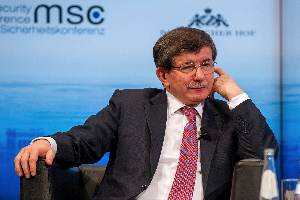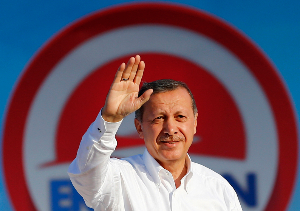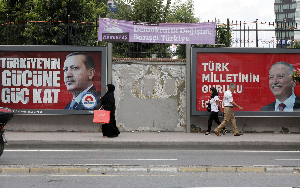What the Columnists Say
The question that continues to preoccupy many commentators in the Turkish press is the direction that President Erdoğan is taking Turkey. Baskın Oran, a leading political scientist and pundit, drew a historical parallel to the epochs of Atatürk and the sultan Abdülhamid II, noting that Erdoğan is copying Atatürk in his methods, while copying Abdülhamid II ideologically. Meanwhile, the statement that General Necdet Özel, the Chief of the General Staff of the Turkish military, made during the official state reception on August 30 that the military is held in the dark about the peace negotiations between the government and the Kurdish movement and that the military is going to react if its “red lines” are crossed, was welcomed in a comment in the daily Zaman. It was noted that the words of the military deserves to be listened to and that a solution that lacks the support of the armed forces does not stand any chance of success.

Looking Strong but Fragile: A New AKP and a “New Turkey”
By Halil Karaveli (vol. 7, no. 15 of the Turkey Analyst)
The appointment of Ahmet Davutoglu to head the ruling Justice and Development Party (AKP) represents a doubling down on the party’s Sunni Islamic ideology. But ideology alone will not be sufficient to keep the AKP in power. The self-confident ideological rhetoric that proclaims the advent of a “New Turkey” masks what is in fact a fragile economic reality. Such rhetoric is not indefinitely going to be a substitute for the kind of material progress absent which the prospects for the “New Turkey” and its power-holders look bleak.

What the Columnists Say
Two topics dominate the comments after Turkey’s presidential election: the strong showing of Selahattin Demirtaş, the Kurdish candidate, who succeeded in appealing to a broader electorate, and who is generally seen as the real star of the election; and the failure of Ekmeleddin İhsanoğlu, the lackluster joint candidate of the opposition parties CHP and MHP. Liberal and social democratic commentators see Demirtaş’ success as heralding the birth of a new left. These commentators stress that the CHP needs to heed the call of this new left and warn that the party is doomed if it persists in allying itself with the rightist MHP. Meanwhile, the public rift within the AKP between the supporters of president-elect Recep Tayyip Erdoğan and the outgoing president Abdullah Gül has led many commentators to speculate about the future of the AKP. The prediction is made that Turkey’s course will be determined by the outcome of the intra-AKP struggle.
Turkey's Presidential Election: The Clouds on Erdogan's Horizon
By Gareth Jenkins (vol. 7, no. 14 of the Turkey Analyst)
Despite his convincing victory in the presidential elections on August 10, 2014, there appears little prospect of Prime Minister Recep Tayyip Erdoğan being able to replace Turkey’s parliamentary system with a presidential one and ruling the country singlehandedly for two successive five-year terms.

Erdoğan Wins Presidency With an Unsustainable Majority
By Micha’el Tanchum (vol. 7, no. 14 of the Turkey Analyst)
President-elect Recep Tayyip Erdoğan secured his margin of victory with a last minute appeal to Turkish nationalist voters, having failed to expand his support among Kurds despite significant overtures on Kurdish issues. President-elect Erdoğan faces an ineluctable choice between expanding his “Kurdish Opening,” moving Turkey closer to becoming a binational state, and assuaging right-wing Turkish nationalism. Neither choice bodes well for a Justice and Development Party (AKP) majority in Turkey’s 2015 parliamentary elections. The AKP will be hard put to manage rising expectations among Turkey's Kurds while retaining Turkish nationalist support.








